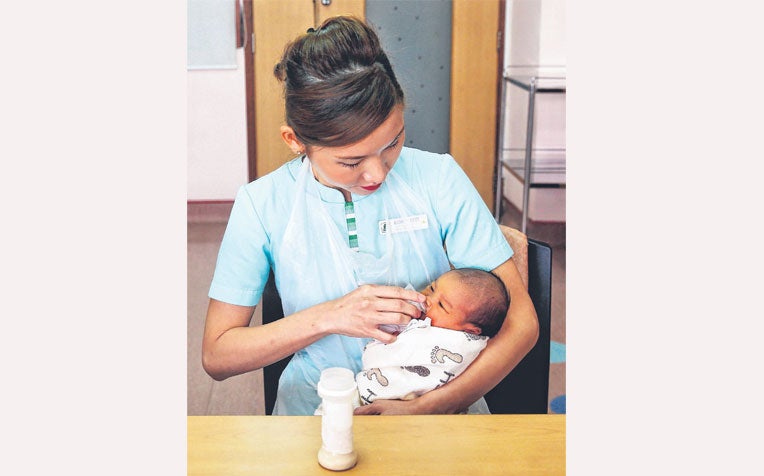
for parents to continue with brands after their babies leave hospital.
Parents may soon find it cheaper to feed their newborn babies with a move by three public hospitals in Singapore to switch to cheaper milk powder.
Those who feed their babies with infant formula could find their costs halved when the hospitals offer cheaper ready-to-feed (RTF) brands to infants in hospital from July 1.
As most parents prefer to stick with the formula their infants had been fed while in hospital, this makes it easier for them to continue with the cheaper brands after their babies leave the hospital.
The two brands to be offered by the hospitals are Nestle’s Lactogen and Danone’s Dulac. The companies clinched a tender against 10 others to supply the hospitals with RTF formula for a year from July 1, 2018, until the end of June 2019.
The hospitals that will bulk-buy these brands are Singapore General Hospital (SGH), National University Hospital and KK Women’s and Children’s Hospital.
The retail prices for Lactogen and Dulac are $2.20 and $2.50 per 100g respectively, much cheaper than the six brands now used at SGH, which cost between $5 and $7.50 per 100g.
As a result of the bulk procurement, parents would pay between $17.30 and $20.90 per kg of formula if they choose to continue with the same brands after the hospital stay, said the Health Ministry. The prices would be maintained for the duration of the contract.
The hospitals’ move was announced yesterday by Senior Minister of State for Health Amy Khor. It comes after a furore earlier this year over the high cost of infant formula, with prices of most brands more than doubling over the past decade.
Under the tender agreement, the retail price of the two brands would not be raised during the year specified in the tender.
Speaking on the sidelines of a tour of SGH’s maternity and labour wards, Dr Khor said there will be significant savings for parents who need to turn to infant formula.
 She said all infant formulas sold here provide the necessary nutrition for babies. The two that won the tender are not necessarily the cheapest, she said, as one criterion is their ability to provide RTF formula for hospital use.
She said all infant formulas sold here provide the necessary nutrition for babies. The two that won the tender are not necessarily the cheapest, she said, as one criterion is their ability to provide RTF formula for hospital use.
Even with cheaper formula, Dr Khor stressed that breastfeeding remains the best option for both mother and baby.
The proportion of mothers who exclusively breastfed at the time of discharge from the three public hospitals has risen from 76 per cent in 2013 to 86 per cent today, she noted. This was largely due to greater awareness of the benefits of breastfeeding, she added.
Associate Professor Daisy Chan, a neonatologist at SGH, said breastfeeding lowers the mother’s risk of getting breast and ovarian cancers and helps her return to her previous weight faster.
For babies, it is the “optimal nutrition, (and) reduces their risk of getting infections, helps them bond with their mother and is free”, she said. Prof Chan said studies also show that babies who are breastfed have slightly higher intelligence.
But she noted that some infants do require formula, either because their mothers are not able to breastfeed or are not producing enough milk for the baby.
SGH uses six RTF brands, which are offered on rotation to babies who need them. It charges parents a standard $1 per feed.
Ms Nabilla Hashim, 29, whose first child, a girl, was born at SGH on Wednesday, plans to breastfeed her daughter for the first two years.
But the bank receptionist said she may need to supplement breast milk with formula in future.
Civil servant Teo Ee Hong, 39, who was at SGH with his wife, Ms Chin Siew Mei, 34, who is expecting their fourth child, said his children took different brands of formula, depending on what they had been given in hospital, until age three or four. He said he was not too bothered by the prices.
Contributed by














 Get it on Google Play
Get it on Google Play